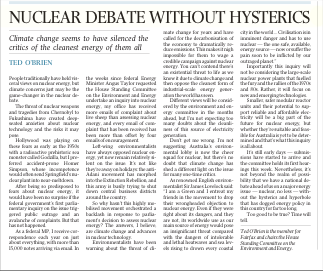Climate change seems to have silenced the critics of the cleanest energy of them all.
People traditionally have held visceral views on nuclear energy, but climate concerns just may be the game-changer in the nuclear debate .
The threat of nuclear weapons and tragedies from Chernobyl to Fukushima have created deepseated anxieties about nuclear technology and the risks it may pose.
Hollywood was playing on these fears as early as the 1950s with a radioactive prehistoric sea monster called Godzilla, but I preferred accident-prone Homer Simpson, whose incompetence would often send Springfield’s nuclear plant into near-meltdown .
After being so predisposed to fears about nuclear energy, it would have been no surprise if the federal government’s first parliamentary inquiry on the issue triggered public outrage and an avalanche of complaints. But that has not happened.
As a federal MP, I receive correspondence each year on just about everything, with more than 15,000 notes arriving via email. In the weeks since federal Energy Minister Angus Taylor requested the House Standing Committee on the Environment and Energy undertake an inquiry into nuclear energy, my office has received more emails of complaint about live sheep than assessing nuclear energy, and every email of complaint that has been received has been more than offset by four emails of encouragement.
Left-wing environmentalists have always opposed nuclear energy , yet now remain relatively silent on the issue. It’s not like they’re away on holidays: the anti-Adani movement has morphed into the Extinction Rebellion, and this army is busily trying to shut down central business districts around the country.
So why hasn’t this highly mobilised movement orchestrated a backlash in response to parliament’s decision to assess nuclear energy? The answers, I believe, are climate change and advances in nuclear technology.
Environmentalists have been warning about the threat of climate change for years and have called for the decarbonisation of the economy to dramatically reduce emissions. This makes it nigh impossible for them to wage a credible campaign against nuclear energy. You can’t contend there’s an existential threat to life as we know it due to climate change and then oppose the cleanest form of industrial-scale energy generation the world has seen.
Different views will be considered by the environment and energy committee in the months ahead, but I’m not expecting too many doubts about the cleanliness of this source of electricity generation.
Don’t get me wrong. I’m not suggesting Australia’s environmental lobby is now the cheer squad for nuclear, but there’s no doubt that climate change has shed a different light on the issue for many one-time critics.
As renowned English environmentalist Sir James Lovelock said: “I am a Green and I entreat my friends in the movement to drop their wrongheaded objection to nuclear energy. Even if they were right about its dangers, and they are not, its worldwide use as our main source of energy would pose an insignificant threat compared with the dangers of intolerable and lethal heatwaves and sea levels rising to drown every coastal city in the world … Civilisation is in imminent danger and has to use nuclear — the one safe, available, energy source — now or suffer the pain soon to be inflicted by our outraged planet.”
Importantly this inquiry will not be considering the large-scale nuclear power plants that fuelled the fury and the rallies of the 1970s and 80s. Rather, it will focus on new and emerging technologies.
Smaller, safer modular reactor units and their potential to support reliable and affordable electricity will be a big part of the future for nuclear energy, but whether they’re suitable and feasible for Australia is yet to be determined and that’s what this inquiry is all about.
It’s still early days — submissions have started to arrive and the committee holds its first hearings this week. Nevertheless, it’s not beyond the realm of possibility that we have a national debate ahead of us on a major energy issue — nuclear, no less — without the hysterics and hyperbole that has dogged energy policy in this country for far too long.
Too good to be true? Time will tell.
Ted O’Brien is the member for Fairfax and chairs the House Standing Committee on the Environment and Energy.
This OpEd appeared in The Australian on 28 August 2019
Listen to my interview with Peter Stefanovic from Sky News on 30 August 2019 below
